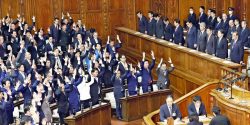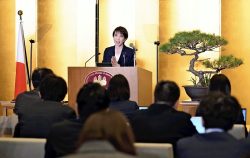- Yomiuri Editorial
- 75th anniversary of Constitution coming into effect
Discuss constitutional revision to deal with turbulent period / Recognition of SDF must be put off no longer
12:30 JST, May 3, 2022
Today marks the 75th anniversary of the Constitution of Japan coming into effect. This can serve as an opportunity for each and every one of us to think about how the supreme law should be made appropriate for these turbulent times.
Russia’s invasion of Ukraine has illustrated the harsh reality that the sovereignty of a neighboring country can be violated by a unilateral, outrageous act of a great power. The United Nations has failed to function adequately, and the post-World War II international order has been shaken.
Japan is no exception when facing the risk of having its sovereignty threatened by other countries. In order to protect our national security, discussions must be deepened with the Constitution as the basis.
Preamble’s ideals further away
The Constitution was enacted in the aftermath of the war, during the Occupation by the Allied Powers. The preamble states that the Japanese people “have determined to preserve our security and existence, trusting in the justice and faith of peace-loving peoples of the world.”
However, the ideals of the preamble on which the renunciation of war have been premised have not been realized, as it has become clear that trusting “the peoples of the world” is not enough to maintain peace.
Around Japan, China has become a military superpower that regularly intrudes into Japanese territorial waters of the Senkaku Islands and North Korea has repeatedly launched missiles.
It is time to face this reality and consider measures to protect the people and contribute to peace in the international community.
The biggest focus of constitutional revision is how to position the Self-Defense Forces, which are tasked with national security. In addition to national defense, the SDF is involved in international contributions, disaster relief and medical assistance. The people of Japan place a great deal of trust in them.
Nevertheless, because Article 9 stipulates that Japan will not maintain war potential, some constitutional scholars have their doubts, viewing the SDF as unconstitutional. The need to dispel the argument that the SDF is unconstitutional is becoming even greater.
According to a Yomiuri Shimbun public opinion poll, the percentage of respondents who said the Constitution should be revised has risen to 60%, compared to 38% who opposed it. The most common item that should be revised was “retention of armed forces for self-defense,” chosen by 45%.
These results seem to indicate that the public is becoming increasingly aware that the role of the SDF should be clarified against the backdrop of the severe security environment. It is important for the ruling and opposition parties to take these trends in public opinion into account and set a course as soon as possible.
In 2018, the Liberal Democratic Party proposed adding a provision outlining the grounds for the SDF while maintaining Article 9.
While debate remains as to whether the SDF constitutes “war potential” as Article 9, Paragraph 2 forbids to be maintained, it is a step forward that the LDP has presented a concrete draft for the article. Each party should use this as a basis for discussions.
Regarding the SDF, Japanese Communist Party Chairperson Kazuo Shii is reported to have said, “In the event of an imminent unjustified invasion, we will use all means, including the SDF, to protect the lives of the people and the sovereignty of Japan.”
Although this contradicts the JCP platform that calls for the dissolution of the SDF, Shii’s remarks are probably an acknowledgement of the significance of the SDF. The other opposition parties must also discuss the Constitution without turning away from real threats.
Emergency provision also important
Giving consideration on how to respond to emergencies must speed up. At the Commission on the Constitution of the House of Representatives, the LDP argued that Japan also needs an emergency provision, citing the Ukrainian Constitution as an example.
The Ukrainian Constitution stipulates that when the president declares martial law or a state of emergency the terms of parliament members will be extended until the situation is settled. In fact, even after the start of the Russian invasion, the Ukrainian parliament reportedly has continued to function, including by enacting laws.
Japan’s Constitution has few provisions regarding emergencies, and if elections cannot be held during a state of emergency, the term of office of Diet members may expire, leading to vacancies. The lack of a provision for emergencies such as large-scale disasters and outbreaks of infectious disease is concerning.
Parties including Nippon Ishin no Kai (Japan Innovation Party) and the Democratic Party for the People are open to extending the terms of Diet members in the event of an emergency. It is important to consider a specific draft of an article with reference to examples from other countries.
Elections to test parties
During the current Diet session, the commissions of the Constitution of both the lower house and the House of Councillors are continuing active discussions.
This is likely a reflection that opposition parties positive toward constitutional revision, such as Ishin no Kai, gained seats in the lower house elections last year. In the upper house elections in July, the stance of each party toward constitutional revision will certainly be judged. Each party should consolidate its views and present a clear position.
The lower house’s Commission on the Constitution compiled a report that online deliberations in the Diet are constitutionally possible, but limited to emergency situations. While there are still technical issues, it is commendable that the ruling and opposition parties discussed the issue and presented a certain interpretation of the Constitution.
Furthermore, there are many issues to be discussed, including a review of the division of roles between the two chambers of the Diet, disparities in vote values and measures to deal with a digital society. The parties are urged to continue to engage in constructive discussions and narrow down the items for constitutional revision.
(From The Yomiuri Shimbun, May 3, 2022)
Top Articles in Editorial & Columns
-

40 Million Foreign Visitors to Japan: Urgent Measures Should Be Implemented to Tackle Overtourism
-

University of Tokyo Professor Arrested: Serious Lack of Ethical Sense, Failure of Institutional Governance
-

China Provoked Takaichi into Risky Move of Dissolving House of Representatives, But It’s a Gamble She Just Might Win
-

Policy Measures on Foreign Nationals: How Should Stricter Regulations and Coexistence Be Balanced?
-

PM Takaichi Should Help Young Japanese Break Seniority Barrier to Vitalize Politics
JN ACCESS RANKING
-

Japan Institute to Use Domestic Commercial Optical Lattice Clock to Set Japan Standard Time
-

Israeli Ambassador to Japan Speaks about Japan’s Role in the Reconstruction of Gaza
-

Man Infected with Measles May Have Come in Contact with Many People in Tokyo, Went to Store, Restaurant Around When Symptoms Emerged
-

Prudential Life Insurance Plans to Fully Compensate for Damages Caused by Fraudulent Actions Without Waiting for Third-Party Committee Review
-

Woman with Measles Visited Hospital in Tokyo Multiple Times Before Being Diagnosed with Disease




















